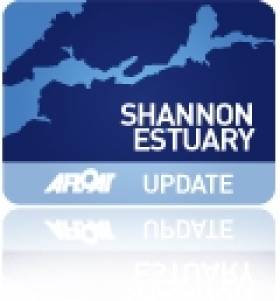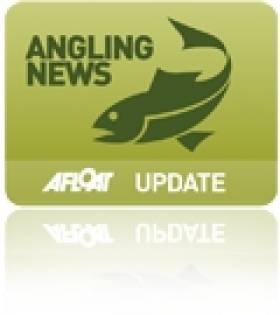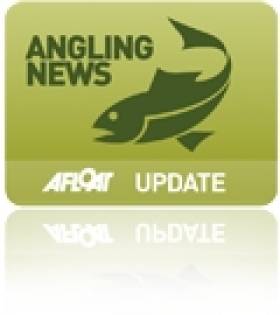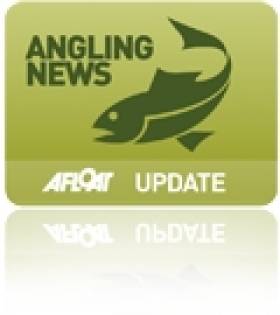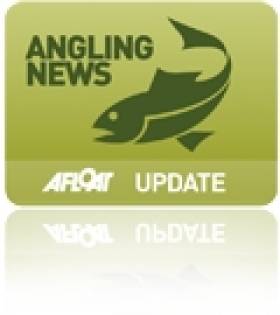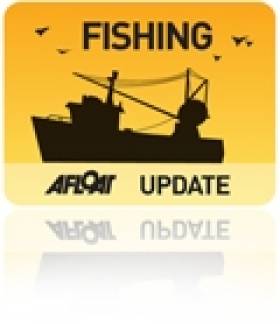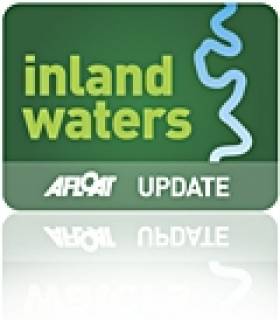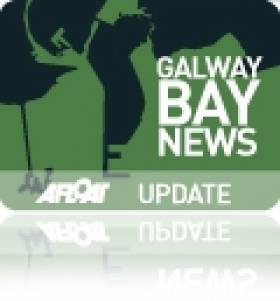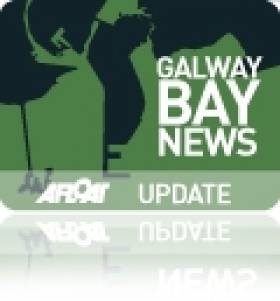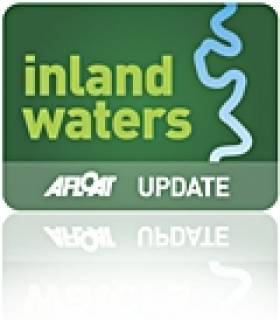Displaying items by tag: Inland Fisheries Ireland
Illustrated Talks On Shannon's Natural Heritage Throughout February
#Shannon - MulkearLIFE and Inland Fisheries Ireland have announced details of a series of free illustrated talks taking place in Limerick throughout February on the extraordinarily rich natural heritage of Ireland, and in particular the Lower Shannon.
The talks form part of MulkearLIFE’s Environmental Education Programme, an outreach programme in local schools and the local community in the Mulkear catchment. The series will be hosted over four Tuesday evenings and will include leading experts sharing their knowledge on farming and conservation and biodiversity management.
Among the talks will be the fascinating story of Atlantic salmon in the River Shannon, presented by Dr Phil McGinnity on 12 February. Dr McGinnity is Beaufort Principal Investigator with UCC’s Aquaculture & Fisheries Development Centre, with more than 23 ears of experience in fisheries science and management, and his talk will outline new and extremely exciting research on the genetic make-up of various salmon types found in the Shannon. He will also examine the history of salmon fisheries on the Shannon. His talk should be of particular interest to anglers far and wide and anyone with a general interest in Irish biodiversity.
On 19 February, Colette O’Flynn will relate the scary story of what is emerging in terms invasive non-native animals and plants arriving into Ireland's coastal and inland waterways. O’Flynn is a research officer with the National Biodiversity Data Centre in Waterford. She manages the National Invasive Species Database for Ireland, which tracks non-native invasive animals and plants in Ireland. She is involved with many European and international invasive species information networks and has been involved with invasive species policy development for the European Commission. She previously worked in various areas in biodiversity education and awareness. Her talk should be of interest to a wide variety of people, especially anglers and those with an interest in Irish wildlife and general biodiversity.
The series of illustrated talks will conclude on 26 February with a talk by Eamon Cusack on building partnerships for sustainable fisheries on the Lower Shannon. Cusack is extremely well known in the fisheries world with over 35 years experience in inland fisheries management. As the former CEO of the Shannon Regional Fisheries Board, he encountered many of the challenges facing fisheries management, and has hands-on experience of policy development, strategic management, change management, enforcement, development and rehabilitation. This talk will focus on his recent work to bring together anglers and the ESB to provide to build effective and durable partnerships for sustainable fisheries. His talk should be of particular interest to local anglers and anyone with a general interest in conservation management and planning.
But the series begins on 5 February with a talk presented by Ruairí Ó Conchúir on conservation farming and biodiversity in the Upper Mulkear Catchment. Ó Conchúir is the manager of MulkearLIFE and has worked in land care management, rural development, farming for conservation and fisheries restoration work for over 20 years, including 10 years in Southern Africa. His talk will focus on the work of MulkearLIFE with farmers over the past three years, with a particular emphasis on partnership work with farmers to improve local habitats. The talk will also attempt to map out where upland farming in Ireland is heading and review work in other uplands parts of Ireland, and outline the likely implications are for upland communities, related farming and habitats post 2014. His talk should be of particular interest to anyone with a general interest in farming, the Irish uplands and the future of EU agri-environmental supports post 2014.
The venue for all talks is the Inland Fisheries Ireland office at Ashbourne Business Park, Dock Road, Limerick. There is plenty of free parking at the front of the building at night. Talks will commence at 8pm sharp and there is free admission to all talks. Further information regarding any of the talks may be obtained from the project [email protected] or from MulkearLIFE, Inland Fisheries Ireland (Limerick) at 061 300 238 or 087 062 5582.
New Regulations For Salmon Anglers As Season Begins
#Angling - The Irish Times' angling correspondent Derek Evans welcomes the start of the salmon angling season tomorrow with a look at regulation changes for 2013.
Among them he notes that the number of open fisheries has risen to 55, while 59 rivers - five fewer than last year - will be closed, which marks some progress in Inland Fisheries Ireland's (IFI) efforts to ensure sustainability of Ireland's freshwater fish stocks.
Meanwhile, the catch and release programme has been modified to encompass the River Liffey from Islandbridge to Leixlip Dam for the first time, although at 32 the scheme includes two fewer rivers than last year.
"Catch and release will maintain, among other things, club membership interest and ensure a good footfall on the riverbank," writes Evans.
"Provided catch and release protocols are practised correctly, research has shown that the survival rate can be close to 100 per cent."
The Irish Times has more on the story HERE.
IFI Repeats Concerns Over Aran Islands Fish Farm
#Angling - Anglers on the River Feale in Kerry and Limerick have been assured by Inland Fisheries Ireland (IFI) that it supports their concerns over the proposed deep-sea fish farm in Galway Bay, as the Limerick Leader reports.
Local anglers are among those throughout the region who have rallied in opposition to plans for the Aran Islands fish farm project, over fears that it would lead to “an explosion” in parasitic sea lice which would prey on wild inland salmon from Irish rivers feeding in the North Atlantic.
IFI reiterated its statement issued last month in which its board said it does not believe "that the corpus of peer reviewed international scientific literature which recognises the negative impacts of sea lice on salmonids have been adequately dealt with" in the Environmental Impact Statement prepared by Bord Iascaigh Mhara (BIM) as part of the public consultation process.
A spokesperson for IFI told the Limerick Leader that the authority has "major concerns about the location and scale [of the farm], as well as its potential impact on sea life. [IFI] is not supporting it in its current form.”
Earlier this month the National Inland Fisheries Forum also criticised as "flawed" the consent process regarding the 15,000-tonne organic salmon farm planned off Inis Oirr, which would be the largest of its kind in Europe.
If approved, the operation could more than double Ireland's current production rate of farmed salmon.
The Limerick Leader has much more on the story HERE.
High Court Rules In Favour of IFI In Gweebarra Fishery Dispute
#Angling - Judgement in the first module of a High Court trial over a long-running dispute between Inland Fisheries Ireland (IFI) and local anglers at the Gweebarra fishery has been found in favour of the fisheries agency.
Ms Justice Laffoy delivered her judgement on Wednesday 19 November in the first part of a modular trial sought by IFI "to allow key issues to be determined in this first module with the objective of saving court time and costs".
The first module related to what IFI said are the most important sections of the Donegal fishery (both State and privately owned) that it manages - such as the well-known 'Mayo Pool'.
A key claim by defendants Peadar O'Baoill and others - who are opposed to changes in fishing arrangements introduced by IFI (then the Northern Regional Fisheries Board) in 2007 - was that they had acquired rights to fish freely without permits at the Gweebarra fishery by virtue of angling freely there for many years prior to the regulation changes five years ago.
IFI argued that if such rights were upheld, it would have made the 2007 arrangements "unworkable" as the rod management plan central to the changes was dependent on regulation by issue of permits.
However Ms Justice Laffoy rejected the defendants' claim in this regard, saying: “The reality is that the defendants have not established any right, public, or otherwise, to fish in the freshwater part of the Gweebarra River, including the part thereof the subject of this module.”
The court also determined conclusively that IFI has the right to manage, control and regulate both the State-owned and privately held freshwater sections of the Gweebarra fishery.
In her concluding remarks, the judge urged both parties to resolve their remaining dispute locally and out of court.
Commenting after the trial, IFI repeated its "previously stated position that it has absolutely no wish to be involved in proceedings of this nature and remains committed to the protection of the Gweebarra fishery in its entirety, the public portion of which is a state asset.
"It welcomes any initiative which will allow for sustainable management of the fishery into the future. It is happy therefore to seek to resolve the remainder of the dispute, but such would have to be found in the context of existing legal agreements with other stakeholders."
IFI Launches 2013 Angling Sponsorship and Salmon Conservation Schemes
#ANGLING - The Inland Fisheries Ireland (IFI) annual Sponsorship Scheme for 2013 is now open for applications.
There are some changes to the scheme for 2013, with biosecurity and catch and release conditions "safeguarding Ireland’s wonderful inland fisheries and sea angling resources".
Prizes may be sponsored under the scheme, but must be fishing tackle or angling-related in order to support those providing a service to Ireland's estimated 500,000 anglers.
The scheme is open to federations, clubs, individuals, youth groups, commercial salmon sector, etc who in the past have gained sponsorship for competitions, angling lessons, heritage projects and international, national and local events, all of which promote some or all of the following: inland fisheries, recreational angling and conservation.
Minister Fergus O'Dowd welcomed the scheme, saying: “Angling, and Ireland’s wonderful fisheries are there for all to enjoy. IFI, by supporting such activity is empowering individuals and organisations to boost their local economies, teach all ages and abilities to fish, have a hobby for life, and helping protect and sustain our fisheries resource into the future.”
Full details of the scheme are available on the IFI website and the closing date for receipt of applications is 15 January 2013.
Meanwhile, Minister O'Dowd has also announced the opening of the 2012-13 Salmon Conservation Fund Contributors Scheme, which has an initial allocation of €200,000 available for projects which help in the conservation of wild Atlantic salmon.
Applications are invited from clubs, fishery owners, individuals and commercial salmon fishermen who have contributed to the fund by 15 March 2013.
According to IFI, the scheme - which was run on a pilot basis for the previous two years - has been a success to date, with projects from all over Ireland awarded funding.
Applicants work with IFI to agree projects and many have been successful in securing additional LEADER funding.
The minister commented: “I never cease to be impressed by the work enthusiastic, passionate anglers and individuals can get done, ensuring that our natural resource is conserved and protected for future generations.
"The long term effect will ensure biodiversity and improved stocks of salmon from which Ireland can derive economic benefit through recreational angling, and commercial exploitation in years to come.”
Details of the scheme can be downloaded from the IFI website HERE.
BIM to Hold Public Tender for Galway Bay Fish Farm
#FISHFARM - Bord Iascaigh Mhara (BIM) is set to hold a public tender process for the development of the proposed deep sea fish farm in Galway Bay, according to The Irish Times.
Financiers around the world have expressed interest in the 500-hectare organic salmon farm to be located off Inis Oirr in the Aran Islands, though BIM said it was not at liberty to disclose who they are.
As previously reported on Afloat.ie, the proposed fish farm would be the largest of its kind in Europe, set to double the State's production of organic salmon.
BIM says it is already receiving inquiries for jobs from emigrants wishing to return home.
However the scheme has faced opposition from Inland Fisheries Ireland (IFI) and local anglers, who cite the potential threat to wild salmon numbers in the area.
IFI recently issued a statement regarding its submission on the project's Environmental Impact Statement, raising concerns about the scale of the development and the impact of sea lice - infestations of which are often concentrated by aquaculture.
The public consultation that began in mid-October is scheduled to conclude next Wednesday 12 December.
Minister Launches Fisheries Conservation Conference
#INLAND FISHERIES - Minister of State Fergus O’Dowd was on hand to launch the Atlantic Aquatic Resource Conservation (AARC) conference in Limerick on Wednesday 28 November.
The conference, attended by delegates from five countries, is intended to showcase integrated collaborative water resource management projects across the European Atlantic Arc, comprising Portugal, Spain, France, Britain and Ireland.
The AARC project is the culmination of work undertaken by 13 international partnerships across these five countries, and the conference provides an opportunity to share the research, findings and recommendations to support the conservation of native fish species.
As the project nears conclusion next month, all AARC project requirements have been met and exceeded in a number of cases, according to Inland Fisheries Ireland (IFI).
In Ireland specifically, the project has made a valuable contribution to the Shannon Salmon Restoration Plan (SSRP) which looks at redressing the decline in Atlantic salmon populations throughout the Shannon river system.
Overall, says IFI, AARC has provided an important instrument to facilitate a pan-European approach to conserving our indigenous, migratory fish stocks.
Speaking at the launch of the conference, Minister O’Dowd highlighted the importance of EU research programmes like AARC in enhancing international research and collaboration.
“The strong inter-regional co-operation, under AARC, between regional authorities and research institutions has increased our knowledge of the conservation requirements of these important European fish species,” he said.
“AARC has ensured that we will play our part in utilising this new knowledge and co-operation for the enhancement of the conservation status of important EU species and habitats.”
AARC is a three-year project, launched in 2009, which focuses on migratory stocks of protected fish species: shad, Atlantic salmon, sea trout, sea lamprey, European eel and smelt. Across Europe these species have economic, cultural and environmental value but are in decline.
The issue of their decline is truly transnational, says IFI, and can only be addressed through long-term intensive transnational collaboration.
A major theme running through the AARC project was establishing the role of wider stakeholders in the management of our aquatic resources. Many of the AARC partners have worked to engage local stakeholders in protecting, conserving and managing these resources through the AARC project activities.
In Ireland, the project dealt with restorative initiatives for Atlantic salmon in the Shannon system. This included determining the genetic composition of contemporary and historical populations of salmon in the Shannon and comparing the relative performance in the wild of the progeny Feale, Mulkear and Shannon wild and hatchery salmon populations.
IFI was joined in the project by fellow partners ESB Fisheries Conservation, University College Cork and the Marine Institute. Of the total project budget of €3.87m, Irish partners received €754,242 over the three years.
The Shannon AARC project will address issues pertaining to fish passage, water quality, habitat and hatchery programmes in addition to the construction of a project specific geograpgic information systems (GIS), co-ordination of stock assessment surveys and the promotion of catchment management.
Ultimately it will help identify important factors in the conservation of Atlantic salmon in the Shannon, and will provide a set of useful maps and a spatial visualisation tool for improved planning and development throughout the Shannon catchment.
Results will help inform fisheries staff of the current status of Atlantic salmon populations in the Shannon as well as provide a useful inventory or potential and/or historical salmon locations in the Shannon.
The project will also benefit inter-agency co-operation, particularly in relation to River Shannon fisheries management, and will strengthen the links with relevant research institutions and international fisheries experts.
Angling Writer 'Deeply Concerned' Over Aran Islands Fish Farm Plans
#GALWAY FISH FARM - In his latest angling column for The Irish Times, Derek Evans writes of his 'deep concern' over the proposed deep sea salmon farm off the Aran Islands in Galway Bay.
Making reference to new research that shows infestations of sea lice - which often concentrate in fish farms - pose a significant threat to the survival of wild salmon fisheries, as previously reported on Afloat.ie, Evans writes that the "untold damage" from such infestations would be "nothing short of catastrophic".
He adds: "While this latest proposal is a step in the right direction in terms of its 'off-shore' location, nevertheless, it will bring a plethora of problems, beginning with the size of its annual output and the 'baggage' that entails if and when it moves into unchartered waters."
Evans also points to the submission on the Environmental Impact Statement (EIS) made by Inland Fisheries Ireland (IFI), which includes "an additional checklist for consideration including the location and dimension of this proposed farm; site characteristics; production process; potential impacts; monitoring; and organic farming", as well as suggesting an assessment of all wild salmon fisheries in the affected area, plus a full monitoring system and baseline study.
Evan's comments come in the wake of IFI's dispute with Bord Iascaigh Mhara over the exclusion from the statutory consultation of a report critical of the proposed salmon farm off Inis Óirr, which has faced opposition from local salmon anglers.
The Irish Times has much more on the story HERE.
IFI Board Issues Statement on Galway Bay Fish Farm
#GALWAY FISH FARM - The board of Inland Fisheries Ireland (IFI) has issued a statement on the proposed Aran Islands deep sea salmon farm in Galway Bay, which has been the source of some controversy in recent weeks.
The board said it agrees with the recent statement by Minister Fergus O’Dowd on offshore salmon farming, and that it welcomes the development of Ireland’s aquaculture sector "once any development complies with Ireland’s obligations under relevant EU environmental legislation, particularly the Habitats Directive, and does not adversely affect salmon and sea trout stocks."
In addition, the IFI board said it has made a submission on the Environmental Impact Statement (EIS) prepared by Bord Iascaigh Mhara (BIM) for the proposed offshore salmon farm as part of the public consultation process, which is available on the IFI website.
As previously reported on Afloat.ie, the public consultation period began last month for the 500-hectare organic fish farm to be located off Inis Oirr. BIM has applied for a deep sea salmon farming licence at the site, which would be one of the largest of its kind in Europe. If approved, the operation could more than double Ireland's current farmed salmon production rate.
The IFI board's statement notes: "In the submission, concerns were raised in relation to the location and scale of the proposed salmon farm and how its development and operation could impact on wild salmon and sea trout stocks and their habitat.
"These concerns are based on scientific reports by respected authors and knowledge of the impact of existing fish farms on salmon and sea trout populations off the west coast of Ireland."
The submission also highlights "recent peer reviewed international scientific literature on the impacts of sea lice on salmonids" which poses a significant threat to wild salmon in Irish waters, as reported on Afloat.ie.
The board said it does not believe "that the corpus of peer reviewed international scientific literature which recognises the negative impacts of sea lice on salmonids have been adequately dealt with in the EIS".
While welcoming "any sustainable initiative which will provide jobs in rural coastal communities", the IFI board said it questions the figure of 500 jobs it's been reported the 15,000-tonne fish farm project would create, making comparison to a new 2,000-tonne aquaculture scheme in Scotland that's expected to create just four full-time positions.
The board members say they "have serious concerns that whatever the number of jobs created by the current proposal, they will be more than offset by the associated loss of jobs in the recreational angling and tourism sectors" if the scheme results in any negative effects on those areas.
"Ireland's reputation as a pristine wild fishery destination must be safeguarded," they added, noting that proposals for two further offshore salmon farms in Mayo and Donegal "are premature given that significant issues over the current proposal have not yet been resolved.
"No further applications should be progressed until all stakeholders are satisfied that the current proposal is sustainable and has no adverse impact on wild salmon and sea trout stocks."
Inland Fisheries Ireland is the State agency charged with the conservation, protection, development management and promotion of Ireland's inland fisheries and sea angling resource.
Sea Lice Pose Significant Threat to Wild Salmon Says New Research
#ATLANTIC SALMON - About 39% of salmon mortalities were attributable to the impact of sea lice on wild salmon fisheries, according to a new international study.
The research, published in Proceedings of the Royal Society B, involved experts from Inland Fisheries Ireland collaborating with the Scottish Oceans Institute at the University of St Andrews, the Department of Zoology at the University of Otago in New Zealand, the Atlantic Veterinary College at the University of Prince Edward Island in Canada and the Institute of Marine Research in Norway.
In a statement on the report, IFI says: "In previously published studies, groups of salmon smolts were treated to protect them against sea lice infestation and other groups were untreated and both groups released to sea into 10 areas of Ireland and Norway. A proportion of these released fish were recaptured as adult salmon one or more years later.
"Analysis of the results of all previously published studies together provide experimental evidence from a large marine ecosystem that sea lice can have large impacts on salmon recruitment, fisheries, and conservation. The sea lice were likely acquired during early marine migration in areas with salmon farming, which elevate local abundances of sea lice."
IFI says the results "indicate that parasite-associated mortality may cause the closure of some fisheries when conservation targets of return adult abundances are not being met. However, the implications of these results may be most serious for small populations in small river systems."
The inland fisheries body explains that the high natural mortality rate of both treated and untreated salmon groups was accounted for, which revealed "a large effect of parasites".
"Precisely because natural mortality rates are high, even a proportionally small additive mortality from parasites can amount to a large loss in adult salmon recruitment," it adds.
Minister of State for Natural Resources Fergus O'Dowd welcomed the report, stating: “From the results of this detailed study, it is crucial that sea lice levels are maintained below [designated] protocol levels, particularly in spring when wild salmon smolts are migrating to sea to avoid increased marine mortality.
Minister O'Dowd added that the results of this study "augment our knowledge in the context of proposals for aquaculture development".
The news comes in the wake of IFI's dispute with Bord Iascaigh Mhara over the exclusion of a report critical of the proposed new deep sea wild salmon farm in Galway Bay from the statutory consultation.
The scheme has faced opposition from local salmon anglers who fear the new facility would pose a threat to wild salmon stocks in Irish rivers by increasing the risk of sea lice infection.


























